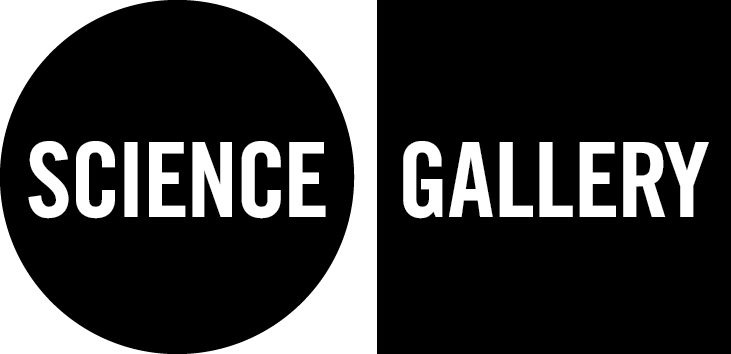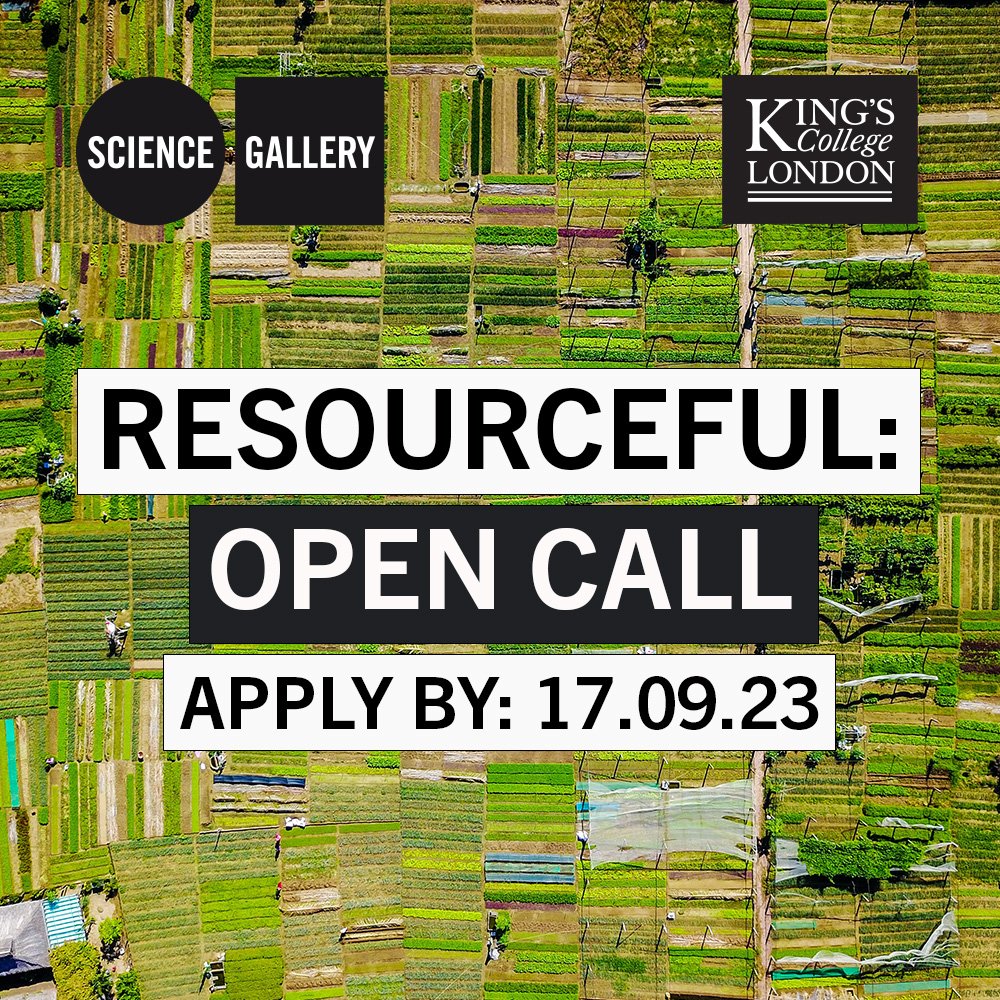SCIENCE GALLERY LONDON AT KING’S COLLEGE LONDON
CALL CLOSED - UNDER REVIEW
Open from 14 August 2023 to 17 September 2023
Deadline: 17 September 2023 at 23:59 CEST/GMT+1
Read the open call in Spanish and Portuguese
Keywords: Climate, sustainability, cities, manufacturing, new materials, extraction, health, just transition, net zero, material sciences, engineering, bioengineering, global health, speculative design.
Science Gallery London is a place to grow new ideas across art, science and health.
A part of King’s College London, we develop our programme in collaboration with our constituent groups: academics and researchers at King’s, King's Students and people aged 18 - 25 years old who live, work or study in Southwark and Lambeth, and artists and creatives.
We’re seeking applications from artists, creatives, community activists and critical thinkers to be part of our Annual Season 2024 programme ‘Resourceful’ (working title), which will comprise exhibited artworks and installations, music and performance nights, workshops, film screenings and discussions. The open call is just one way in which we’ll identify projects for the Season. Through it we seek to connect with a wide range of creative practitioners with ideas connected to our broadly conceived theme, which will be further developed as plans for the season progress over the next year. This application pack offers an overview of the theme and explains how to apply.
1.1 RESOURCEFUL THEME OVERVIEW
RESOURCEFUL explores how we adjust to life in a climate emergency. With living standards decreasing and our health and wellbeing under threat, the present moment feels increasingly unstable. A safer and more equitable future is clearly desirable, even necessary, but what might it look like?
The season investigates the material origins of things we rely on everyday: energy, water, air, rare earth minerals embedded in our devices, food on our plates – and the values and systems we place around them, questioning how this will change in future. What constitutes a ‘resource’, and who gets to decide? And how do we take the steps needed to build more resilient futures for us all?
RESOURCEFUL will be grounded within the urban fabric around Science Gallery London, where community power and mutual aid schemes are flourishing, alongside the international finance headquarters which connect the city to global supply chains and asset trading.
Much of the knowledge and expertise needed for a future in which social and ecological justice are intertwined is already with us. RESOURCEFUL seeks to share and imagine hopeful futures, showing that alternative systems are not just dreams, but practical, action-oriented possibilities that are already happening, and thriving.
1.2 AREAS OF FOCUS
The overarching theme of RESOURCEFUL brings together an interconnected set of issues that encompass everything from materials science to health, policy making and equitable forms of living. We’re particularly interested in project proposals or ideas which tackle one or more of the following areas, all of which are areas of strength within the King’s College London research community:
Material Resources: Food and land use and subsequent implications for health; speculative design and new materials; technological obsolescence; mining and extraction; fashion and manufacturing; natural resource management.
The Built Environment: Urban health and wellbeing (physical and mental); air pollution and environmental health; Cooperative/alternative models of ownership.
How should we live?: Just transition; commons and commoning; intergenerational, indigenous and community knowledge bases; more-than-human perspectives.
Governance, Law and Global Systems: Net zero; international supply chains; systems ecology; risk and resilience; law/legal frameworks, e.g. rights of nature; policy making / activism; circular economies; doughnut economics; de-growth; financialisaton (of nature, energy).
1.3 PROGRAMME STRUCTURE
The Resourceful season will be developed through a programme of public-facing research and development activities based in the Gallery and running from spring 2024. These activities will shape, inform and in some cases form part of the final public programme opening in autumn 2024.
The research and development programme will include the following formats:
1. Resourceful Printing Press / Library We invite you to contribute to a growing open access library and archive for the season. We are interested in the season printing press being a way to augment and share different forms of knowledge exploring ‘resourceful’ themes. Project ideas which involve producing, curating or archiving printed matter would sit well within this format. The Resourceful Printing Press will form part of the final Season programme in autumn 2024.
2. Resourceful Takeover Space We invite ideas for ‘takeovers’ that create spaces and moments for mutual exchange and dialogue responding to the question: ‘How are we meant to live?’ A takeover might take the form of a temporary display, pop-up installation or series of gatherings through which an individual or group occupy space within the Gallery for periods of around 4 weeks during the season. This format could be utilised as part of the final Season programme in autumn 2024.
3. Resourceful Commons The Gallery will be facilitating space for horizontal and community-led knowledge sharing as part of the development of the season . We are interested in working with artists, young people and researchers to co-design a curriculum exploring the question “how are we meant to live?” in this era of transitions. Curriculum elements could involve field trips, walks, workshops and more!
The resulting public programme running from autumn 2024 will include the following formats:
4. Resourceful Season installations and artworks We invite ideas for new or existing artworks and installations. These will be presented as part of a group show, which may be installed across multiple sites within the Gallery. Artists pitching ideas for this part of the programme may be invited to further develop their projects in collaboration with academics and researchers and/or students and young people. These relationships will be initiated and supported by Science Gallery London.
5. Resourceful Season events Share your ideas for music and performance nights, discussions, workshops, screenings are more. Artists pitching ideas for this part of the programme may be invited to further develop their projects in collaboration with academics and researchers, and/or students and young people. These relationships will be initiated and supported by Science Gallery London.
2. APPLICATION GUIDELINES
2.1 APPLICATION REVIEW CRITERIA AND PROCESS
The applications are reviewed by gallery staff and a curatorial panel including 18–25-year-olds drawn from the gallery’s Sustain Space programme. There will be three rounds of review. The first round will help us decide which applications we don’t think will work for the programme and which applications we want to review in greater detail. Longlisted applications will then be reviewed with the curatorial panel and season advisors, drawn from King’s research departments. Then we make a shortlist and invite applicants for interviews to find out more. Proposals are judged on their fit with the season areas of focus, target audience, feasibility and quality of concept.
We value projects that are simple in their invitation, opening the door for complex debate and ongoing enquiry. We love projects that are iterative, interactive, contribute to genuine research and that are interdisciplinary. We like humour, provocation, speculation, and irreverent ideas that entertain or intrigue people first and then educate them.
We will let everyone know by three months after the closing date of the open call, depending on how many applications we receive. While we won’t have capacity for individual feedback we will provide as much information as possible about how our decisions were made.
2.2 COMPLETING THE APPLICATION FORM
When proposing a project, please bear in mind the gallery’s context as part of a university, its purpose and principles, which are available here.
You are welcome to submit a video explaining your idea if you prefer; please make it no longer than 5 minutes and in MP4 format. In the video, please verbally respond to any questions which you are not writing the responses to.
You can submit an idea for a new project or an existing project, please tick the appropriate box.
In either case, we would like to know: what your idea is, how you might approach collaboration with academics, a rough sense of the cost to realise the project as you envisage it, as well as any technical requirements you foresee at this stage.
We ask that you attach an up-to-date CV with five images showing recent artworks, or a link to an up-to-date website which includes your CV and images of recent artworks. Being clear and specific about how you anticipate realising the project idea while retaining a sense of flexibility which could allow for collaborators to contribute is our recommended approach. It should be clear from your description how the project connects to the RESOURCEFUL theme.
Costing your project
We have not stipulated budget ranges within the brief. If your proposal is selected, we will work with you to develop the project (see the question above) which may involve some deviation from production ideas as initially conceived.
We ask that you include a rough breakdown of the projected cost for realising your project, to give a sense of your intentions. Projects in previous seasons have ranged from 500 GBP for an event to between 2000-4000 GBP for an installation. The Artist’s Information Company provides helpful resources on how to calculate artists fees here.
Projects with co-funding are considered.
Approaching researcher collaboration
We do not expect you to identify or reach out to potential academic collaborators at the application stage; we will help to facilitate those relationships where appropriate when projects have been selected. In some cases, we exhibit works by artists who have not collaborated with academics or community groups. Where we feel that a project idea might benefit from this kind of collaboration, we will propose that to you and work with you to identify suitable collaborators. You will be asked in the application form to outline your approach to this kind of collaboration.
2.3 FURTHER CONSIDERATIONS
What is your target audience?
Our Seasons are created with young people 18+ in mind, with a focus on 18-25 year olds. It’s important that you think about how this audience will connect with your work.
Other visitors to the gallery include the university and hospital campus community (healthcare workers, patients, researchers, students).
Can I propose one-off events or more short-term projects?
Yes, we will consider these for the wider public programs. Generally, though, we won’t spend the same amount of time and resources on a one-day activity as a six-month installation. So, think about the scale of what you are pitching in relation to projected costs.
About the exhibition spaces
For further information about the Science Gallery London building and gallery space please see here. The maximum height of the spaces is approximately 2.7m.
If you are proposing artwork for exhibition, please note that your work will be sharing space with other artworks, and that light and sound conditions may not be constant. Artworks will need to be robust - we anticipate a footfall of about 30,000 people over a 6-month duration.
Who can I contact if I have a question relating to my application?
Please contact Laura Purseglove, Producer at Science Gallery London, laura.purseglove@kcl.ac.uk
Other Science Gallery Network wide Frequently Asked Questions are answered here. https://sciencegallery.org/faqs
Please note that we are using a system – called Submittable– to accept open call submissions. You will need to create a new account with Submittable in order to submit to current and future open calls.
Open call closes on 17 September 23:59 CEST / GMT+1


